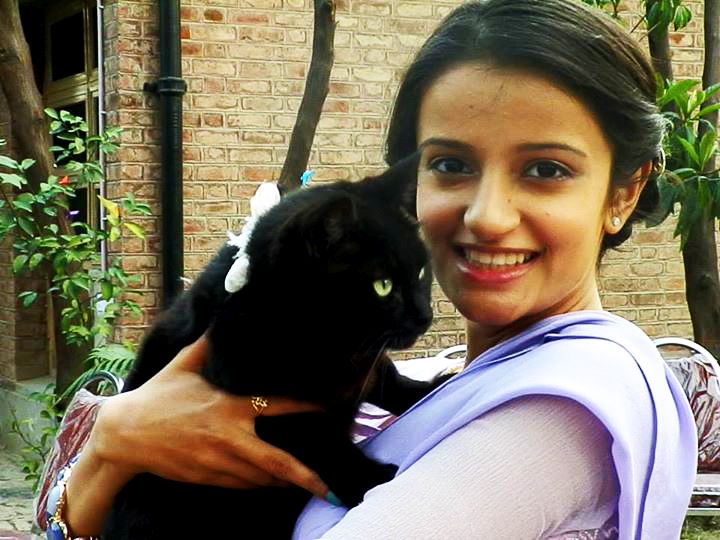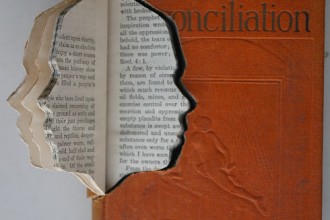Yusra Amjad is part of an emerging generation of Pakistani writers — at home both on the page and online, and bold enough to speak up against censorship, against oppression and against institutionalised sexism. Her work first appeared in The Missing Slate in May 2014, and she was one of our short fiction contest winners at the Lahore Literature Festival 2015. Continuing our Poet of the Month series, she talks to Camille Ralphs about the challenges of publishing online, why she tends to avoid ‘mangoes and monsoons’ poetry, and why even getting out of bed and putting pen to paper can be seen as a political act.
Do you think there is a tangible difference between how we read work online and how we read work on a physical page? How do you feel when you encounter your own work on these platforms?
I have a teacher who doesn’t allow the use of ebooks in her class and I think that attitude is stubborn and absurd. But I don’t think we can deny that the experience of reading the printed word is different from reading digitally. I think you revisit a physical book in a way that you don’t revisit an ebook. There’s this article called “Is Google making us stupid?†that discusses the way online reading affects our brains and the way they process information, and the internet has definitely had a tangible effect on that.
I haven’t written creatively on paper in months. I use a couple of popular writing apps, and write on paper only when the technology fails me — battery dead etc. So nowadays, anyone who reads my work is reading it on a screen almost all of the time. If having my poetry online makes it accessible to more people who will appreciate it, I consider that a blessing. With fiction, I feel it’s different. Fiction requires a concentration and attention that is perhaps better suited to the printed word. Like any aspiring writer, I want to be published and see my work in print.
It’s a sad fact that Pakistani poetry is not as readily available in Pakistan as one would hope. That being said, according to one of my friends, Pakistani writers should at all costs avoid “mangoes and monsoon†writing. I suppose the concern there is that Pakistani poetry will come to be defined by cultural clichés that appeal to western audiences looking for “exoticismâ€. I’ve read some “Pakistani†poems that are the poetic equivalent of tourist attractions. A lot of them are just out of touch, often stemming from a colonial idea of what poetry with a capital P is supposed to be. There are some gems. One Athar Tahir poem, ‘Partition’. I like Mina Malik: I think her work has emotional honesty. And a poem called ‘Grandmother’ by Sameenah Shirazie. There’s also a Bangladeshi poet called Azra Tabassum whose work I enjoy.
I couldn’t say there’s a dominant theme in Pakistani poetry any more than there is in American poetry or English poetry, in either form or content, but I probably haven’t read enough of it to judge. What I would say is that a lot of Pakistani poetry is tame. It doesn’t yell at you, it doesn’t leap off the page. And as for mangoes and monsoons, the thing is, if those two things are important experiences to you and you have sufficient skill to write about them originally, by all means write about mangoes and monsoons. One way to look at writing is: either you pull something off, or you don’t. That’s all it comes down to, in the end, once you strip off the politics. But then, you never do strip the politics off anything, let alone art.
As for my own poetry, most of it you could read without ever guessing it’s “from Pakistanâ€, especially when compared to the fiction I write, which is full of cultural references. I find, though, that poems that do allude to my culture or religion or nationality are better received. I like weaving the personal and political together in my writing, and that’s a very Pakistani thing to do! In my earliest memories, the Sharif brothers were in power, and now I’m almost 22 and they’re still reigning over us…there’s a poem in there somewhere. Gender roles and patriarchy are other themes that keep appearing in my poems — both those things are Pakistani and universal at the same time.
Do you think there is really any such thing as fiction in literature anymore, in the era of Karl Ove Knausgård et al., or has all literature — and especially poetry —become confessional?
I think poetry and fiction are simply too different for me, so I’ll have to separate them. I do not think fiction has become confessional, the fantasy genre and the dystopian genre are both very much alive and kicking, as is YA fiction. I don’t think we’re in any danger of losing the craft of fiction. One of my favourite contemporary writers is Daniel Handler and he does brilliant, mischievous, absurd, cheeky things with fiction as a craft.
As for confessional poetry, for starters, I’m not sure I like that term — it’s come to be one of those politely sexist terms, even though it was originally applied to W.D. Snodgrass. It’s also just outdated. It comes from a time when readers and critics were surprised that people wrote candidly about their emotions and experiences. Nowadays, saying that poets write about their feelings is like saying the sky is blue — what else would it be?
So, does that mean fiction has lost its place in poetry? In some ways. Look at how popular slam poetry has become, and that is usually very personal and certainly very “confessionalâ€, but from another perspective, it’s also story-telling, which is what fiction essentially is. And story-telling will always have its place in poetry. Read, for example, ‘Miss Lina (for Lina Medina, youngest mother in history)’ by Blythe Baird, which is a fictionalisation of a real event in poetic form. I don’t think you can necessarily separate, or should separate, the confessional from the fictional in poetry.
‘Tarazoo’ has been accused of being misandrist and classist by a friend who said it assumed that every working class street vendor man is a violent misogynist. The accusation of misandry I dismiss, but I did worry the poem implied that domestic violence is purely the issue of a certain socioeconomic class.
Am I feminist poet? Here is what I can tell you: firstly, if you asked that question in a room full of people who have read my poems, you’d get a resounding yes in response. Secondly, I am a feminist, and the longer I exist in this world, and the more women and men I talk to, the more of a feminist I become. I can tell you I enjoy reading and writing about female experiences. I am fascinated by women, by gender, by how it is constructed and how those constructions play out in society. Female empowerment does not look the same in every society; it does not even look the same in two different women. And I am fascinated by the different ways in which we empower ourselves. I’m fascinated by themes of sexuality in literature, and if you’re talking about feminism you have to at some point talk about sexuality.
I can also tell you that the most important thing to happen to me as a poet was to inspire a response from another young poet from across the world who related to a poem I wrote about the patriarchal elements in institutionalised religion. To have written something that spoke to a young woman raised in another nation and another faith is one of the most worthwhile things I have done as a writer and as an individual.
I should also add that I have a poem that’s (flippantly) titled ‘How To Be A Feminist’.
I guess the difference between those two things — a feminist poet, and poet who happens to be a feminist, lies in whether or not your feminism works its way into your writing. And in order to determine that, we have to ask, what is a feminist poem? And that’s too complex and loaded a question to answer. And then you get into whether poetry should have any ideological sympathies in the first place. The old unresolved debate, between art for arts sake and art as political. And though, at heart, I’ve been an “art for art’s sake” advocate for as long as I can remember, the truth is, to quote my sociology professor, “even the act of getting out of bed in the morning is political.” If we accept that as true, then the act of a woman getting out of bed and putting pen to paper in a patriarchal society is undeniably political.
As a young poet, what do you see as your role in the poetry world (assuming you think you have one) and its development? Do you think young poets today — and young people generally, in fact — are in a very fraught position, with so many potential avenues to explore? Or do you see this as an advantage?
Oh, I don’t know if I have a role in the poetry world, I’m sure it will develop with or without me and I don’t think I’ll change that much in any way. What I would like to do, with my fellow young poets, is continue to write with our backs turned on the hordes of “this isn’t real poetry real poetry is written with a feather quill on parchment by candlelight and makes at least five Homeric references and incorporates several Latin phrases and is only about the themes that I deem fit for poetry! Bah! Humbug!” type critics.
In some ways, yes, it is a fraught position. If you want to get published nowadays, there are hundreds upon hundreds of literary journals and websites and you have to find the ones that are “right†for your work. There’s a risk in publishing online on a personal platform like a blog or your own website, because that work in no longer eligible for most publications, online or otherwise. On the other hand if you’re successful you might find an audience and thus create a demand for your work when you do publish. So it’s a risk. But we’re also able to make our work so much more accessible, to so many more people, with so much ease. You can get more feedback. You can better see what other poets are doing, how it’s different from you, and figure out your niche. In a way I guess there’s tougher competition.
As for young people in general, I hear them complain about a lot of things — I’ve never heard anyone complain about having too many options. Maybe it’s because we take our options for granted now, but nevertheless, what young people have to do today is the same thing that young people have always had to do: figure their shit out. And nowadays, we don’t choose between options as much as we try to grab it all. It is easier for students to earn in this age, for example, so we don’t have to choose between work and study, as much as we have to grit out teeth and do both (and probably not get much sleep). It’s easier to pursue our passions and easier to share our creative work. It is easier to socialise, though the quality of those interactions are hard to assess. Do I think all these opportunities are advantages? Yes. I also think they are a potential recipe for wide-eyed insanity.





